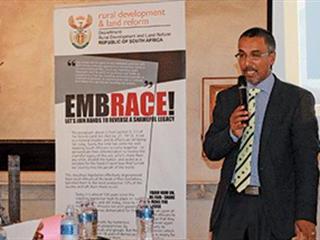
This was according to Anwhar Madhanpall, SA Sugar Association’s land reform manager speaking at the recent Ad hoc Committee meeting at Tala Game Reserve outside Durban. Madhanpall said the re-opening of the land claims window would be destructive to the agricultural economy. According to Madhanpall, 38% of sugarcane land (130 400ha) was already under unsettled gazetted claims.
“Should government choose to re-open claims, it will stall resettlement and redistribution programmes. Claims could be made on land that has already been restored and cause serious conflict … and there won’t be any land available to the market. We appeal to government not to gazette (any more claims) until the Regional Land Claims Commission has the resources to settle. Otherwise it will encumber the land and stop investment,” he said.
Madhanpall said 21% of South Africa’s commercial sugarcane growing area (70 627ha) had been transferred to freehold black farmers. “By March 2014, the Regional Land Claims Commission would have transferred 18 000ha in the sugar industry, which will bring the industry close to 25% black ownership by the end of the financial year,” he said.
Advocate Bheki Mbili, chief director of DRDLR KZN Restitution Support, said 15 000 claims in KZN had been settled or restored and 2 000 claims were outstanding, of which 1 300 had not yet been researched. Reference group representative, Thokozane Zondi said he hoped the re-opening of claims would be delayed until these claims had been finalised. Kwanalu CEO Sandy La Marque said she had seen little progress with restitution in KZN over the past four years.
“Implementation challenges are not being addressed, so delays in restitution will continue. There is no list of gazetted claims. Let’s find out what we are dealing with before we start the new process,” she said. Recently-released results of government’s land audit found that 50% of KZN land was state-owned, with 46% in private hands and 4% unaccounted for. “There is a perception that private land is white-owned, but it is here that you will find companies like Sappi and Mondi, foreign-owned or BEE-styled businesses and trusts,” said La Marque.
Kwanalu’s land audit, indicated that out of 9,2 million hectares in KZN, 46,29% was state owned or held by the Ngonyama Trust. “Our audit found that 15,61% of farms were white-owned, 2,3% were black-owned, and 35,8% was unaccounted for,” La Marque said. Nhlanhla Mndaweni, chief director for DRDLR KZN agreed that government’s next big audit would be to determine the race of land owners.










